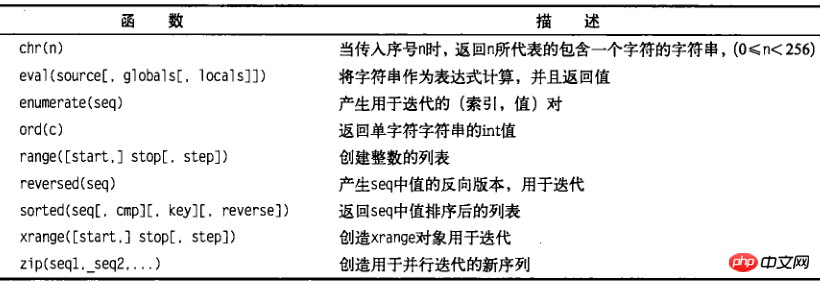Python의 조건, 루프 등에 대한 소개
- 高洛峰원래의
- 2017-03-08 11:06:351574검색
사전에서 키-값 쌍 가져오기
>>> x={'a':1,'b':2}
>>> key,value=x.popitem()
>>> key,value
('a', 1)
>>> del x[key]
Traceback (most recent call last):
File "<pyshell#16>", line 1, in <module>
del x[key]
KeyError: 'a'
>>> x
{'b': 2}
>>> x[key]=value
>>> x
{'a': 1, 'b': 2}
>>> del x[key]증분 할당
>>> x=2 >>> x+=1 >>> x*=2 >>> x >>> fnord='foo' >>> fnord+='bar' >>> fnord*=2 >>> fnord 'foobarfoobar'
if 문의 조건부 실행
>>> name=raw_input('?') ?Yq Z >>> if name.endswith('Z'): \ print 'Hello,Mr.Z' Hello,Mr.Z
else 절
>>> name=raw_input('what is your name?')
what is your name?Yq Z
>>> if name.endswith('Z'):
print 'Hello,Mr.Z'
else:
print 'Hello,stranger'
Hello,Mr.Zelif 절
>>> num=input('Enter a number: ')
Enter a number: 5
>>> if num>0:
print 'The number is position'
elif num<0:
print 'The number is negative'
else:
print 'The number is zero'
The number is position조건부 중첩문
>>> name=raw_input('What is your name?')
What is your name?Yq Z
>>> if name.endswith('Yq'):
if name.startswith('Z'):
print 'Hello,Yq Z'
elif name.startswith('K'):
print 'Hello,Zyq'
else:
print 'Hello,Yq'
else:
print 'Hello,stranger'
Hello,stranger>>> number=input('Enter a number between 1 and 10:')
Enter a number between 1 and 10:6
>>> if number<=10 and number>=1:
print 'Great!'
else:
print 'Wrong!'
Great!>>> age=10
>>> assert 0<age<100
>>> age=-1
>>> assert 0<age<100
Traceback (most recent call last):
File "<pyshell#21>", line 1, in <module>
assert 0<age<100
AssertionErrorwhile 루프
>>> x=1
>>> while x<=100:
print x
x+=1>>> while not name:
name=raw_input('Please enter your name:')
print 'Hello,%s !' % name
Please enter your name:zyq
Hello,zyq !for 루프
>>> words=['this','is','an','ex','parrot']
>>> for word in words:
print word
this
is
an
ex
parrot
>>> range(0,10)
[0, 1, 2, 3, 4, 5, 6, 7, 8, 9]
>>> for i in range(1,8):
print i
2
4
6사전 루프(반복)
>>> d={'x':1,'y':2,'z':3}
>>> for key in d:
print key,'corresponds to',d[key]
y corresponds to 2
x corresponds to 1
z corresponds to 3병렬 반복
>>> names=['Anne','Beth','George','Damon']
>>> ages=[12,19,18,20]
>>> for i in range(len(names)):
print names[i],'is',ages[i],'years old'
Anne is 12 years old
Beth is 19 years old
George is 18 years old
Damon is 20 years oldrrree번호가 매겨진 반복
>>> zip(names,ages)
[('Anne', 12), ('Beth', 19), ('George', 18), ('Damon', 20)]
>>> for name,age in zip(names,ages):
print name,'is',age,'years old'
Anne is 12 years old
Beth is 19 years old
George is 18 years old
Damon is 20 years old
>>> zip(range(5),xrange(100))
[(0, 0), (1, 1), (2, 2), (3, 3), (4, 4)]뒤집기, 정렬 반복
>>> d
[1, 2, 4, 4]
>>> for x in d:
if x==4:
d[d.index(x)]=6
>>> d
[1, 2, 6, 6]
>>> S=['skj','kiu','olm','piy']
>>> index=0>>> for s1 in S:
if 'k' in s1:
S[index]='HH'
index+=1
>>> S
['HH', 'HH', 'olm', 'piy']>>> for index,s2 in enumerate(S): #enumerate函数提供索引-值对
if 'H' in s2:
S[index]='DF'
>>> S
['DF', 'DF', 'olm', 'piy']루프에서 벗어나
>>> sorted([4,3,6,8,3]) [3, 3, 4, 6, 8] >>> sorted('Hello,world!') ['!', ',', 'H', 'd', 'e', 'l', 'l', 'l', 'o', 'o', 'r', 'w'] >>> list(reversed('Hello,world!')) ['!', 'd', 'l', 'r', 'o', 'w', ',', 'o', 'l', 'l', 'e', 'H'] >>> ''.join(reversed('Hello,world!')) '!dlrow,olleH'
True/break
>>> for n in range(99,0,-1):
m=sqrt(n)
if m==int(m):
print n
break루프
>>> while True:
word=raw_input('Please enter a word:')
if not word:break
print 'The word was '+word
Please enter a word:f
The word was f
Please enter a word:List comprehension-lightweight loop
>>> for n in range(99,81,-1):
m=sqrt(n)
if m==int(m):
print m
break
else:
print 'h'
hpass
>>> [x*x for x in range(10)]
[0, 1, 4, 9, 16, 25, 36, 49, 64, 81]
>>> [x*x for x in range(10) if x%3==0]
[0, 9, 36, 81]
>>> [(x,y) for x in range(3) for y in range (3)]
[(0, 0), (0, 1), (0, 2), (1, 0), (1, 1), (1, 2), (2, 0), (2, 1), (2, 2)]
>>> result=[]
>>> for x in range(3):
for y in range(3):
result.append((x,y))
>>> result
[(0, 0), (0, 1), (0, 2), (1, 0), (1, 1), (1, 2), (2, 0), (2, 1), (2, 2)]
>>> girls=['Alice','Bernice','Clarice']
>>> boys=['Chris','Arnold','Bob']
>>> [b+'+'+g for b in boys for g in girls if b[0]==g[0]]
['Chris+Clarice', 'Arnold+Alice', 'Bob+Bernice']del x와 y의 else 문은 동시에 목록을 가리키지만 x를 삭제하면 y에는 영향을 미치지 않습니다. 목록 자체(값)는 삭제되지 않고 이름만 삭제됩니다.
>>> if name=='Nsds':
print 'Welcome!'
elif name=='UK':
#还没完
pass
elif name=='Bill':
print 'Access Denied'
else:
print 'Nobody!'exec
>>> x=['Hello','world'] >>> y=x >>> y[1]='Python' >>> x ['Hello', 'Python'] >>> del x >>> y ['Hello', 'Python']
참고: 네임스페이스를 범위라고 합니다. 보이지 않는 사전과 마찬가지로 변수를 보관하는 장소라고 생각하세요. x=1과 같은 할당문을 실행하면 키 x와 값 1이 현재 네임스페이스에 배치됩니다. 이 네임스페이스는 일반적으로 전역 네임스페이스입니다.
>>> exec "print 'Hello,world!'"
Hello,world!
>>> from math import sqrt
>>> exec "sqrt=1"
>>> sqrt(4)
Traceback (most recent call last):
File "<pyshell#36>", line 1, in <module>
sqrt(4)
TypeError: 'int' object is not callable
#增加一个字典,起到命名空间的作用
>>> from math import sqrt
>>> scope={}
>>> exec 'sqrt=1' in scope
>>> sqrt(4)
2.0
>>> scope['sqrt']평가는
>>> len(scope)2 >>> scope.keys() ['__builtins__', 'sqrt']

위 내용은 Python의 조건, 루프 등에 대한 소개의 상세 내용입니다. 자세한 내용은 PHP 중국어 웹사이트의 기타 관련 기사를 참조하세요!
성명:
본 글의 내용은 네티즌들의 자발적인 기여로 작성되었으며, 저작권은 원저작자에게 있습니다. 본 사이트는 이에 상응하는 법적 책임을 지지 않습니다. 표절이나 침해가 의심되는 콘텐츠를 발견한 경우 admin@php.cn으로 문의하세요.
이전 기사:Python dict 사전 자세한 설명다음 기사:Python dict 사전 자세한 설명

